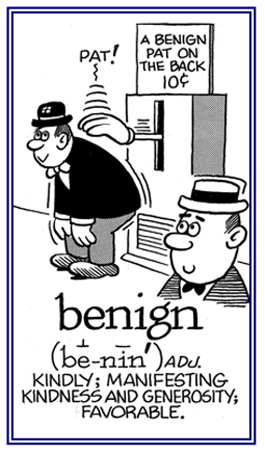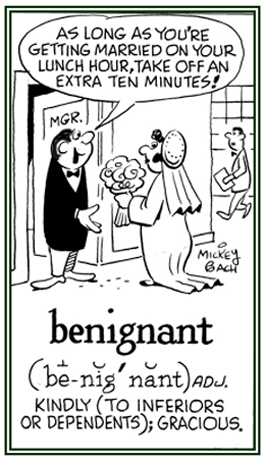bene-, ben-, beni-
(Latin: good, well)
2. Referring to a disorder which is not a threat to life or long-term health; especially, by being noncancerous: Dr. Anderson, the plastic surgeon, removed a benign, or harmless, growth from the side of Carol’s nose.
3. Pertaining to something which is neutral or harmless in its effect or influence and does not threaten one's health or life: Although benign forgetfulness is an inability to immediately remember a name or a date, the item is usually recalled in a short time.
Medical placebos are intended to have a benign effect on patients during medical research trials and experiments.
4. Relating to a condition which is mild or favorable in effect: Jack's family enjoyed their vacation at the lake because there was such a benign climate there.
5. A reference to a situation which is favorable for a recovery with appropriate management: The finance minister attempted to reassure voters that the economy was in a benign status and would improve soon.
6. Etymology: from Old French benigne, from Latin benignus, "good, kind"; literally, "well born", from bene, "well" + gignere, "to bear, to beget", from genus, "birth".

Go to this Word A Day Revisited Index
so you can see more of Mickey Bach's cartoons.
2. Relating to a favorable and desirable situation: There was a warm and benignant breeze blowing up from the river during the afternoon.
3. Descriptive of the kind and courteous behavior of a ruler towards his or her subjects: Once on the throne, the king, who had been young and foolish, was soon beloved by his subjects because of his benignant goodwill towards everyone.

Go to this Word A Day Revisited Index
so you can see more of Mickey Bach's cartoons.
2. A kind or gracious act: After a stressful week, Mrs. Challace, the famed lawyer, enjoyed being home and receiving many benignities from her family; all of whom helped her relax and forget the burdens related to her profession.
2. Etymology: from Middle English, which came from Old French beneison; from Latin benedictio, "praising".
Motto of King Rudolf of Habsburg, Germany (1273-1291).
A motto by Marcus Pacuvilus (c. 220 - c. 130 B.C.) who wrote fourteen plays and a satire. Only fragments of the plays survive.

